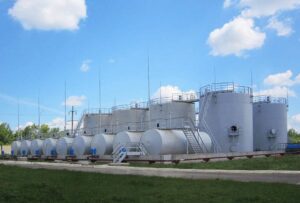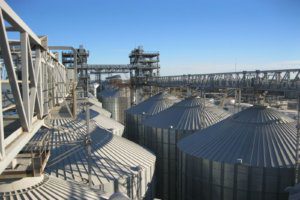
NJSC Naftogaz Ukrainy is studying the issue of building a tank farm for storing strategic reserves of oil and petroleum products at the site of the Pivdenny maritime oil terminal (Odesa region), the company said in a press release published on August 20 with reference to acting CEO Yuri Vitrenko who spoke about it during his trip to the site on 19 August.
“The terminal where we are now is a critical element of the oil transmission system of Ukraine with a huge potential for development. We intend to develop it to boost the reliability of supplying Ukraine with oil. This is an extremely important platform for creating a strategic oil reserve,” he said.
At the same time, Vitrenko said that the strategic oil reserve is necessary both in accordance with European rules and in view of the fact that Ukraine is actually in a state of war with Russia, and still does not have a strategic oil and oil products reserve.
According to the head of Naftogaz, at the first stage it is about the construction of a reservoir for strategic reserves with a capacity of about 120,000 tonnes at the Pivdenny maritime oil terminal site. In general, the first stage of the project may include the construction of up to four tanks.
Pivdenny maritime oil terminal is connected to the Druzhba oil trunk pipeline system near the city of Brody (Lviv region) through the Odesa-Brody pipeline with a length of 674 km and an annual capacity of 9 million tonnes. It was launched in 2001.
MARITIME TERMINAL, PIVDENNY, STORING, STRATEGIC OIL, TANK FARM

Nika-Tera maritime terminal (Mykolaiv), part of Group DF of Dmytro Firtash, is increasing its oilseeds storage capacity to 30,000 tonnes, according to a press release of the port. According to the company, the port is continuing work on commissioning the second phase of a transshipment complex for oilseeds.
According to the report, the volume of cargo transshipment at Nika-Tera port since the beginning of the year amounted to 3.7 million tonnes, which is 10% more than in the same period of 2017, while for the nine months of the current year 221 vessels were handled.
“A significant increase in the volume of transshipment was provided by cargo that was not previously processed in the port: oil, granulated meal and bran, as well as new items of bulk freight,” the press service said citing commercial director of the port Valeriy Salnykov.
Nika-Tera is a highly mechanized marine terminal, part of Group DF’s port business.
The terminal includes four specialized complexes: grain, for transshipment of fertilizers, bulk freight, and liquid cargo.